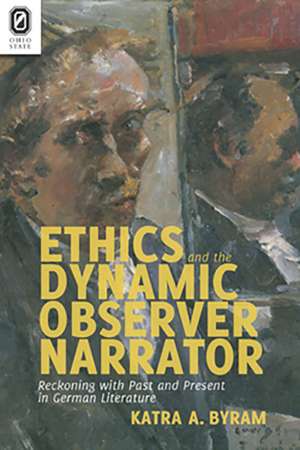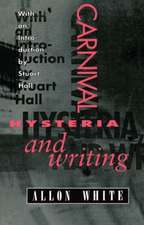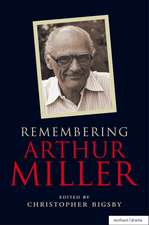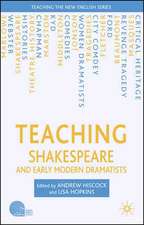Ethics and the Dynamic Observer Narrator: Reckoning with Past and Present in German Literature: THEORY INTERPRETATION NARRATIV
Autor Katra A. Byramen Limba Engleză Paperback – 20 mar 2016
In Ethics and the Dynamic Observer Narrator: Reckoning with Past and Present in German Literature, Katra A. Byram proposes a new category—the dynamic observer form—to describe a narrative situation that emerges when stories about others become an avenue to negotiate a narrator’s own identity across past and present. Focusing on German-language fiction from the nineteenth and twentieth centuries, Byram demonstrates how the dynamic observer form highlights historical tensions and explores the nexus of history, identity, narrative, and ethics in the modern moment.
Ethics and the Dynamic Observer Narrator contributes to scholarship on both narrative theory and the historical and cultural context of German and Austrian literary studies. Narrative theory, according to Byram, should understand this form to register complex interactions between history and narrative form. Byram also juxtaposes new readings of works by Textor, Storm, and Raabe from the nineteenth century with analyses of twentieth-century works by Grass, Handke, and Sebald, ultimately reframing our understanding of literary Vergangenheitsbewältigung, or the struggle to come to terms with the past. Overall, Byram shows that neither the problem of reckoning with the past nor the dynamic observer form is unique to Germany’s post-WWII era. Both are products of the dynamics of modern identity, surfacing whenever critical change separates what was from what is.
Ethics and the Dynamic Observer Narrator contributes to scholarship on both narrative theory and the historical and cultural context of German and Austrian literary studies. Narrative theory, according to Byram, should understand this form to register complex interactions between history and narrative form. Byram also juxtaposes new readings of works by Textor, Storm, and Raabe from the nineteenth century with analyses of twentieth-century works by Grass, Handke, and Sebald, ultimately reframing our understanding of literary Vergangenheitsbewältigung, or the struggle to come to terms with the past. Overall, Byram shows that neither the problem of reckoning with the past nor the dynamic observer form is unique to Germany’s post-WWII era. Both are products of the dynamics of modern identity, surfacing whenever critical change separates what was from what is.
Din seria THEORY INTERPRETATION NARRATIV
-
 Preț: 283.42 lei
Preț: 283.42 lei -
 Preț: 280.83 lei
Preț: 280.83 lei -
 Preț: 239.67 lei
Preț: 239.67 lei -
 Preț: 234.28 lei
Preț: 234.28 lei -
 Preț: 283.09 lei
Preț: 283.09 lei -
 Preț: 281.44 lei
Preț: 281.44 lei -
 Preț: 266.08 lei
Preț: 266.08 lei -
 Preț: 288.03 lei
Preț: 288.03 lei -
 Preț: 303.58 lei
Preț: 303.58 lei -
 Preț: 329.15 lei
Preț: 329.15 lei -
 Preț: 280.67 lei
Preț: 280.67 lei -
 Preț: 314.98 lei
Preț: 314.98 lei -
 Preț: 294.99 lei
Preț: 294.99 lei -
 Preț: 258.54 lei
Preț: 258.54 lei -
 Preț: 190.00 lei
Preț: 190.00 lei -
 Preț: 282.71 lei
Preț: 282.71 lei -
 Preț: 502.96 lei
Preț: 502.96 lei -
 Preț: 363.07 lei
Preț: 363.07 lei -
 Preț: 286.61 lei
Preț: 286.61 lei -
 Preț: 273.08 lei
Preț: 273.08 lei -
 Preț: 315.95 lei
Preț: 315.95 lei -
 Preț: 274.07 lei
Preț: 274.07 lei -
 Preț: 274.27 lei
Preț: 274.27 lei -
 Preț: 255.21 lei
Preț: 255.21 lei -
 Preț: 282.58 lei
Preț: 282.58 lei -
 Preț: 283.34 lei
Preț: 283.34 lei -
 Preț: 240.43 lei
Preț: 240.43 lei -
 Preț: 255.85 lei
Preț: 255.85 lei -
 Preț: 365.82 lei
Preț: 365.82 lei -
 Preț: 277.71 lei
Preț: 277.71 lei -
 Preț: 237.76 lei
Preț: 237.76 lei -
 Preț: 504.32 lei
Preț: 504.32 lei -
 Preț: 354.67 lei
Preț: 354.67 lei -
 Preț: 542.18 lei
Preț: 542.18 lei -
 Preț: 324.12 lei
Preț: 324.12 lei -
 Preț: 543.17 lei
Preț: 543.17 lei -
 Preț: 311.92 lei
Preț: 311.92 lei -
 Preț: 344.48 lei
Preț: 344.48 lei -
 Preț: 291.10 lei
Preț: 291.10 lei -
 Preț: 227.88 lei
Preț: 227.88 lei -
 Preț: 281.96 lei
Preț: 281.96 lei -
 Preț: 272.33 lei
Preț: 272.33 lei
Preț: 328.40 lei
Nou
Puncte Express: 493
Preț estimativ în valută:
62.85€ • 65.06$ • 53.12£
62.85€ • 65.06$ • 53.12£
Carte tipărită la comandă
Livrare economică 01-07 martie
Preluare comenzi: 021 569.72.76
Specificații
ISBN-13: 9780814252000
ISBN-10: 0814252001
Pagini: 272
Dimensiuni: 152 x 229 x 20 mm
Greutate: 0.4 kg
Ediția:1
Editura: Ohio State University Press
Colecția Ohio State University Press
Seria THEORY INTERPRETATION NARRATIV
ISBN-10: 0814252001
Pagini: 272
Dimensiuni: 152 x 229 x 20 mm
Greutate: 0.4 kg
Ediția:1
Editura: Ohio State University Press
Colecția Ohio State University Press
Seria THEORY INTERPRETATION NARRATIV
Recenzii
“This is a marvelous study in which Katra Byram proposes a new genre, that of the dynamic observer narrative—stories told by a first-person narrator about another person’s experiences. To provide examples of the dynamic observer narrative, Byram takes up some of the most well-known and thoroughly analyzed German novels of the last two centuries. But because her lens is truly original, hers are not just new ‘readings’ of these works; rather, she offers a tool to rethink the relationship between literary production and history and the concept of Vergangenheitsbewältigung—or coming to terms with the past. All students of narrative theory and all students of German prose fiction will want and need to read this book.” —Irene Kacandes, The Dartmouth Professor of German Studies and Comparative Literature
“In Ethics and the Dynamic Observer Narrator, Byram connects issues of narrative ethics in German literature to the pre-WWII context. As such, the book is an excellent contribution to a broader view of narrative responsibility in the context of German literature, especially German novels since the late eighteenth century. Byram includes the traditions of realist criticism, which informs her readings of post-war texts in useful ways. This book will be of interest to scholars of Sebald, Raabe, and Storm, as well as to those interested in Textor, Grass, and Handke. Scholars of narrative theory and rhetoric will also want to read this book.” —Scott Denham, Charles A. Dana Professor of German Studies, Davidson College
Notă biografică
Katra A. Byram is assistant professor in the Department of Germanic Languages and Literatures at The Ohio State University.
Cuprins
Part I–– Contexts of Dynamic Observer Narrative: Philosophy and Narrative TheoryOne: Modern Identity: Historical, Relational—and Narrative?
Two: Structural and Historical Tensions in the Dynamic Observer Narrative
Part II–– Nineteenth-Century Pasts
Three: On the Right Side of History: Emerging Dynamic Observer Narration in Friedrich Ludwig Textor and Theodor Storm
Four: War of the Words: Radical Internarration in Wilhelm Raabe’s Stuffcake
Part III–– Evolving Responses to National Socialism
Five: Günter Grass’s Litanies of the Past: Performative Language and Vergangenheitsbewältigung
Six: My Mother, My Self: Language and (Dis)identification in Postwar Mother Books
Seven: A Footnote to History: German Trauma and the Ethics of Holocaust Representation in W. G. Sebald’s Austerlitz
Two: Structural and Historical Tensions in the Dynamic Observer Narrative
Part II–– Nineteenth-Century Pasts
Three: On the Right Side of History: Emerging Dynamic Observer Narration in Friedrich Ludwig Textor and Theodor Storm
Four: War of the Words: Radical Internarration in Wilhelm Raabe’s Stuffcake
Part III–– Evolving Responses to National Socialism
Five: Günter Grass’s Litanies of the Past: Performative Language and Vergangenheitsbewältigung
Six: My Mother, My Self: Language and (Dis)identification in Postwar Mother Books
Seven: A Footnote to History: German Trauma and the Ethics of Holocaust Representation in W. G. Sebald’s Austerlitz
Descriere
Proposes a new category—the dynamic observer form—to describe a narrative situation that emerges when stories about others become an avenue to negotiate a narrator’s own identity across past and present.













